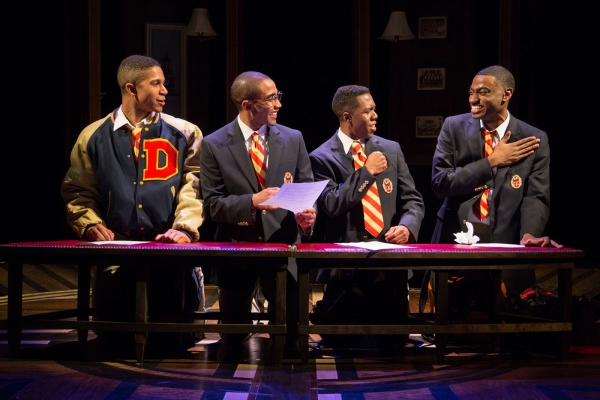Choir Boy

(© Igor Dmitry)
Patrons of the Studio Theatre will undoubtedly recognize the name Terell Alvin McCraney, whose plays have been very popular there over the past several years. Now Studio has mounted another McCraney work, Choir Boy, which examines the lives and relationships of five students heading toward graduation from an elite African-American boarding school.
McCraney tackles many subjects in this taut, well-written play, which is generously laced with extraordinary a cappella singing. As might be expected from such a setting, the main issue he raises has to do with the character of the young men leaving the institution, and their ability to live and lead in the real world.
The Charles R. Drew Prep school has prepared black men for greatness for almost 50 years. Pharus Young (Jelani Alladin) struggles to combine his personal needs with his desire to belong to the larger group of students.
He hopes to become the leader of the legendary school gospel choir, and he is thrilled to be given a solo at the school's 49th graduation. Yet when some students begin calling Pharus "sissy" and "fag" while he is singing, he falters and cannot go on. He is severely criticized by Headmaster Marrow (Marty Lamar).
The story unfolds through a series of short scenes. Following the first one, there are episodes where Pharus reveals himself through a telephone discussion with his mother, a heart-to-heart talk with his roommate, and a chat with the headmaster, in which Pharus explains that when he first came to the school, "everybody didn't like me but I had a place to be me…that's what was so good."
With his lyrical tenor voice, Alladin neatly captures the almost angelic nature of Pharus, then undercuts it with his sassy, boisterous sense of humor. Bobby Marrow III (Keith Antone) is an angry young man, suffering from his parents' recent breakup. A cheery young Junior Davis (Eric Lockley) sticks to Bobby' like glue. David Heard (Jonathan Burke) hopes to have a future in the church. Anthony James (Jaysen Wright) is a baseball player and Pharus' roommate.
All five students have nicely differentiated personalities, clearly highlighted by the actors portraying them. In particular, Antone has a brooding and brutish aura about him, which makes him the perfect foil for Pharus, while Wright plays Anthony as a gentle country boy who can legitimately sympathize with what Pharus is going through. Lamar is strong as Headmaster Marrow. Alan Wade turns in an excellent performance as Mr. Pendleton, the teacher who is hired to guide the choir.
The most interesting thing about these five men is the way they come together when singing. Darius Smith has done a wonderful job of creating a five-part vocal team within McCraney's story. The numbers they perform are familiar gospel songs (including "Sometimes I Feel Like a Motherless Child" and "Hold On," among others), but they are given totally new and surprising musical settings, and each actor gets the opportunity to sing at least one solo.
McCraney's writing is colorful and often poetic. He sometimes uses straightforward prose, then switches to the poetic patois that links the boys when they choose to relate as adolescents rather than men. Director Kent Gash keeps the action flowing quickly and smoothly, using Jason Sherwood's circular set with five, heavy oak doorways to excellent advantage. Only one scene has a slow pace, when the five men take showers. However, the combination of their gentle singing, the low lighting, and the steam from the showers gives the scene a sense of otherworldliness. Lighting designer Dawn Chiang is responsible for a large part of the impact of that scene.
McCraney packs a lot into Choir Boy's 105 minutes. Although his main focus is the way Pharus handles his existence, McCraney is also interested in the lives of all his characters. That McCraney can deal with historical legacy, personal identity, sexuality, and faith in a play that is intelligent, funny, and sensitive suggests once again that McCraney is a young playwright to watch.










